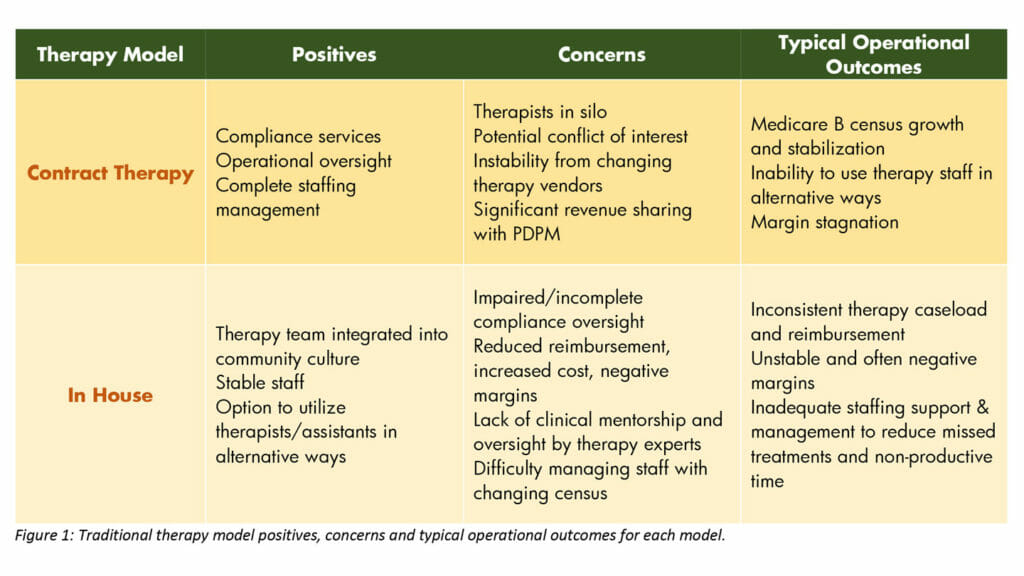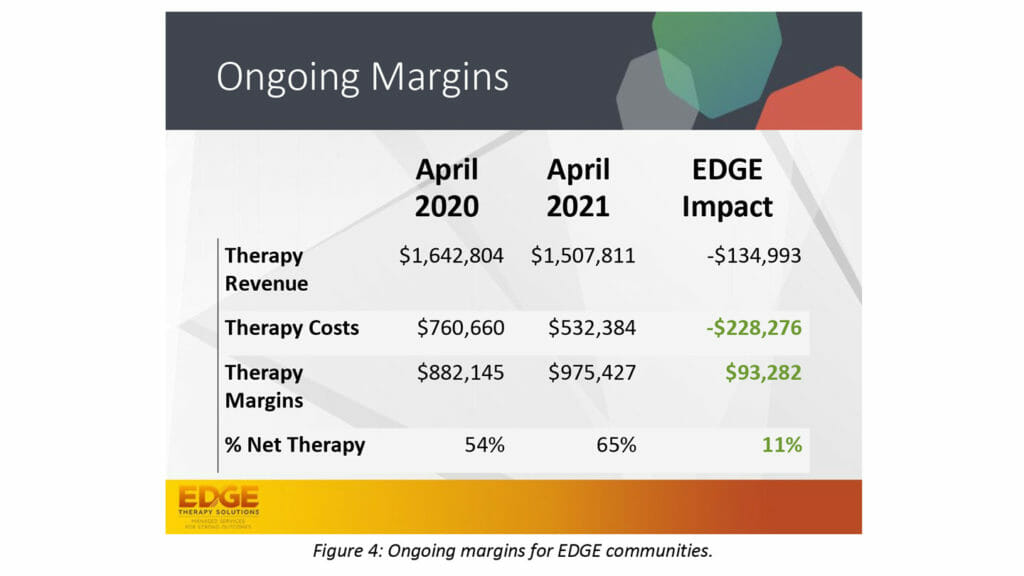
As providers brace themselves for the new reality with the proposed 4.6% PDPM parity cuts in October 2022, they are searching for new strategies to offset these cuts amidst the continued increased costs from inflation and the lasting effects of the pandemic.
While all providers can benefit from a laser focus on PDPM accuracy, that is often not enough to make up for these new financial challenges. An independent research study conducted by Gravity Healthcare Consulting shows that providers have found cost relief, improved reimbursement, and increased therapy margins by transitioning to a new therapy management model, emerging from EDGE Therapy Solutions. PDPM reimbursement increased by $14/day from Q2 of 2021 to Q4 of 2021 for EDGE providers. And all of this was gained while maintaining or improving quality, outcomes and the patient experience.

Most providers have traditionally considered one of two therapy models – contract therapy and going in house. An outstanding contract therapy partner provides exceptional support and compliance oversight, and completely manages all therapy staffing. However, contract therapy has become less appealing to some under PDPM because the amount of therapy minutes no longer dictates skilled reimbursement, but a focus on quality and medical complexity has taken precedence.
In-house has become more appealing to some providers with the shift to PDPM and the reduced focus on therapy volume. However, most have discovered that the real costs associated with ongoing compliance oversight and effective operational management usually result in negative margins within 6 months of transitioning to in-house. And providers are looking for a new solution, which is what inspired the founders of EDGE Therapy Solutions to create a new model, championing the resident, the provider and the therapist equally.

The research study compared the outcomes, costs, and final SNF provider margins for the same months in 2020 versus 2021. All of the study months were during the Public Health Emergency from COVID-19, with an approximately equal impact of COVID across all 8 communities. The communities transitioned from 3 different contract therapy vendors into the new EDGE model, and all communities showed salary cost savings of $69,099.07 a month over the 8 communities.

Controlled and effective reimbursement growth was achieved by all communities as well. In the first quarter with EDGE, the communities received $773,870 in Medicare B/Managed Care B reimbursement. This increased to $1.03 million in Q2 and $1.29 million in Q3. EDGE increased corporate providers’ revenues by an average of 66.7% in 3-quarters through clinical mentorship, implementation of effective systems, long-term care clinical programming, and systematic screening.
The Business Intelligence platform utilized by EDGE includes a vast array of customized reports that allow for effective and targeted oversight, which can be updated and adjusted to constantly changing regulations and industry standards. “It provides transparency to the process,” said Shaun Smith, Vice President of EDGE Therapy Solutions, and allows both the EDGE experts and the SNF ownership to effectively oversee the therapy program.

And the overall margins improved as well, increasing by 11% in April of 2021. All therapy costs were reduced by $228,276, and while overall revenue declined, this was actually due to changes in overall skilled census. The communities set a goal to eliminate agency staffing utilization, and chose to reduce their overall skilled census to maintain quality of care using in-house nursing associates only. Despite this significant change in the availability of skilled residents, EDGE effectively managed the therapy departments to offset these losses, yielding an overall increase in SNF provider therapy margins of $93,282 in just the one month of April.
Opportunities for new partnerships: Alternative staffing solutions
In an ongoing effort to eliminate agencies on campus, EDGE communities leveraged the opportunity to utilize therapy associates in new ways, including providing Nursing Assistant services to cover empty shifts, COVID testing, wellness and actives support. In 2021, just the supplemented nursing services averaged approximately 1,000 hours provided by therapy associates per quarter. And because the therapy resources were not reallocated into the nursing budget, this resulted in an additional savings of approximately $200,000 of nursing staffing agency costs for the communities during 2021.
Also, some communities partnered with the onsite home health agencies to provide therapists. In just one community, this resulted in an additional increase of $48,000 annualized over one year for additonal therapy revenue with no increased cost for the SNF provider.
95% EDGE staff retention

As quality therapists become harder and harder to find, and as more therapists exit the skilled nursing industry, therapy staffing stability has become a critical foundation to success. The EDGE therapists demonstrated the positive impact of the innovative new model with an average of only 4.62% turnover in 18 months from 2021 through the first half of 2022. Therapists reported increased job satisfaction with the EDGE solution, feeling supported yet independent through the mentorship and oversight provided by EDGE. Therapists also reported increased sense of stability due to becoming in-house therapists, and the elimination of worry over a potential lost therapy vendor contract, which typically occurs every 1-3 years for most contract therapy arrangements.
Additionally, therapists saw increased opportunity for job advancement with 3 of the 8 Directors of Rehabilitation selected for advanced leadership tracks at their individual communities within the first year. EDGE also provides a network for therapy managers that is not possible with traditional in-house programs and allows them to leverage the expertise and successes of their peers to propel their success.
Equity interest arrangement
A unique feature for a therapy management model, EDGE also allows for an equity interest arrangement. This innovative feature allows SNF providers to invest in EDGE pursuant to a fair market value determination. The resultant profit distributions made by EDGE to the SNF providers was not included in this study, and would be a potential additional revenue source for EDGE clients to consider. It allows the SNF provider to partake in the profits obtained by the therapy management company so that when therapy wins, the provider wins as well.
‘Compliance is huge’
“Compliance is huge,” said Smith, Vice President of EDGE Therapy Solutions. Outstanding compliance oversight, “takes a lot of the worry away,” Smith said. “It’s impossible if you aren’t immersed to know what you need to know in the industry. EDGE allows you to get and implement it easily.”
The EDGE positives
The results of the study showed the SNF provider therapy margins and reimbursement were significantly impacted by the influence and oversight of EDGE Therapy Solutions. Job satisfaction and staff retention improved because of the new model and the EDGE clinical mentorship. In these difficult financial times, SNF providers need to think outside the box to leverage innovative solutions like EDGE. Ashely Haltenhof, Director of Therapy Services with EDGE sums it up best, “the EDGE management model has been more successful than I ever imagined. It truly does provide our partners with the expertise of a contract company with the benefits of having the therapists be a part of their in-house team. Customers are happy with the successes financially and with employee satisfaction.”
Evaluating your therapy options
Key Indicators that you may need to change models or providers can include:
• Therapy does not address some or most of residents’ needs – especially long-term care!
• Therapists are unmotivated
• Outdated policies and systems = denials and noncompliance
• Productivity is poor
• Excessive non-productive time
• Noncompliance in department
• Therapy not meeting appropriate financial budgets




